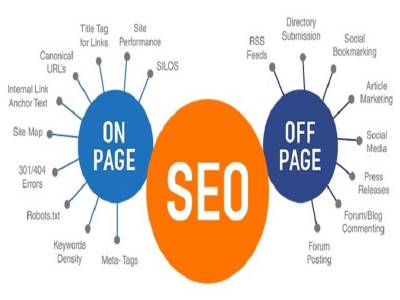How Would You Describe On-Page & Off-Page SEO?

SEO is one of the most crucial aspects of digital marketing. It is the key to lead your website at the top of the Google pages. The question is how it works.
SEARCH ENGINE OPTIMIZATION:
Basically, it is further divided into two different parts, the on-page, and off-page SEO. These strategies allow search engines like Google to index your website. The SEO brings organic traffic to your website by letting people know about the information it offers.
SEO services in Pakistan are offered by many software houses, and most of them assist you in building your brand image that let your website to be ranked on the first page of Google. The following are some differences in how both tools work.
ON-PAGE SEO:
The on-page SEO itself describes that it is something related to the web page directly. In this, your main web page is handled in such a way that it facilitates higher ranking. Like, managing the content quality, structure, and optimizing the HTML code.
Mainly on-page SEO is all about the content of the page, for instance, optimizing the headlines, images, and title Meta (HTML tags). Ensuring that your website contains a high-level of expertise, like trustworthiness and authoritativeness. These things are important because it lets your search engine understand your website and makes it relevant. Google’s complex algorithms allow it to understand what users are actually searching for; making more appropriate content relevancy.
The quality of your page: Content quality includes keywords, these words help users find you quickly. Previously, the websites made the use of keywords several times on a web page making it on the top of Google page. But now search engines penalize for stuffing the keywords and have marked the criteria of keyword density. Hence, making the right combination of keywords with proper research is important. There are many tools available nowadays that help in making your content viable by ensuring the right keyword density.
The Relevancy of web page
Are you sure that your content is relevant? All pictures, images, or videos are up-to-date and target the right audience. Google also considers those websites that show current occasion relevancy, for example, popular brands makes celebration on every event like New Years' Eve, etc. regularly updated website is highly considered by Google.
Structuring your Web page
The most common mistake is skipping the HTML tags on On-page SEO, as they are not directly visible on the web page. Search engines, however, detects these HTML. So it is important to include keywords in Alt Text, title tags, Meta description, and header tags (h1, h2, and h3).
The overall page performance
How your web page performs is also one of the factors included in On-page ranking. While making a website it is to confirm that it is not taking extra loading time making customers frustrated and leave the website instantly. Search engines regard this factor too. Therefore, it is important to optimize images, and websites.
OFF-PAGE SEO:
Off-page SEO is about everything that is indirectly linked to your website such as, backlinks, social signals, link relevancy, etc. Search engine never ranks website totally based on its perfectly done On-page, there are many off-page factors that are equally important to rank your website.
Domain Authority
Domain authority is an important off-page SEO factor that is not completely in your control. The search engine determines through domain authority that how much they can trust your website. Depending on situations like,
- The time duration you had your domain name, the older your domain name is the better it is.
- The search engine also checks the history of the domain name whether it belongs to anyone else prior it belongs to you
- The referring domain number
Building backlinks
Building backlinks is one of the most crucial parts of off-page SEO. A site with valuable backlinks is ranked better by Google. So Backlink is actually a backbone of off-page SEO and it should be carefully done with quality content to let Google know about your website.
There are three main types of links, manually build links, natural links, and self-created links. For natural link the action is done by the page owner, in the manually built link it is done through link-building and self-created links are kind of backlink, blog commenting, or press release including optimized anchor text.
Off-page SEO, Non-link related
Any activity that is indirectly improving your website ranking is linked with off-page SEO. Now after backlinks, there is social media marketing that increases the organic traffic by letting people enter your website again and again. Guest blogging is done by creating guest posts and influencer marketing that is done by endorsement and product placement by the influencer.
It's important to note, though, that the net result of each of these activities is to somehow create a reference to your site from elsewhere on the web — be that reference a link, a mention of your brand or website, or otherwise. So, the concept of truly "non-link-related" off-page SEO is actually a bit of a misnomer!
- Comment
- Posted by Rida Hashmi